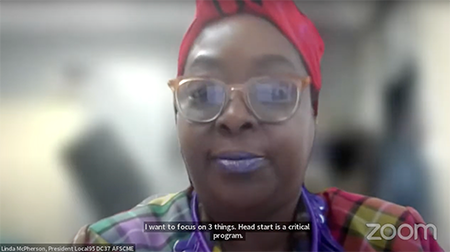
Linda McPherson
Linda McPherson, a member of AFSCME District Council 37 (New York), knows the value of Head Start as well as anyone.
When McPherson immigrated from Guyana to the U.S. more than 30 years ago, she benefitted from Head Start, a federal program that improves the lives of babies, young children and families. She not only enrolled her daughter in early childhood education, but to get resources on earning a GED diploma for herself.
Soon after, McPherson volunteered as a substitute teacher for her daughter’s Head Start program in New York City, which led to a career with the program that has now spanned nearly 30 years.
Last week, in a webinar hosted by Committee for Education Funding (CEF), McPherson and other educators from across the country talked about the critical need for federal investment in education.
McPherson described the critical role that Head Start and educators like her who work in the program play in the lives of the families they serve.
“Head Start teachers are preparing babies and toddlers to become successful in school and life as guided by evidence-based brain and developmental science and provide them with nutritious meals and snacks,” said McPherson.
But McPherson explained that inadequate investment in Head Start — and in education more broadly — has led to a staffing crisis within the program. Too few families who might benefit from Head Start are able to participate.
“Because of inadequate investments, only 36% of Head Start-eligible families and 11% of Early Head Start-eligible families are able to participate. Low wages in the program are further restricting access and have created a workforce crisis,” said McPherson.
“Why are there staff vacancies? Because the pay is too low,” she added. “Head Start and early education compensation has been far too low for decades with wages at or just above the poverty level. The (COVID-19) pandemic, coupled with rising inflation, has made a bad problem worse. Current levels of Head Start funding are inadequate to pay staff salaries that are competitive with their peers, and equal to their education and experience.”
McPherson, the president of Local 95, which represents New York City’s Head Start employees, said that her salary is below $40,000, barely enough to make ends meet.
While AFSCME is fighting for an increase of nearly $5.5 billion for a total of $17.5 billion to sustain and support the Head Start workforce, House Republicans are threatening to roll back federal investments to 2022 levels in their debt ceiling bill, likely cutting programs like Head Start by about 22% or more.

